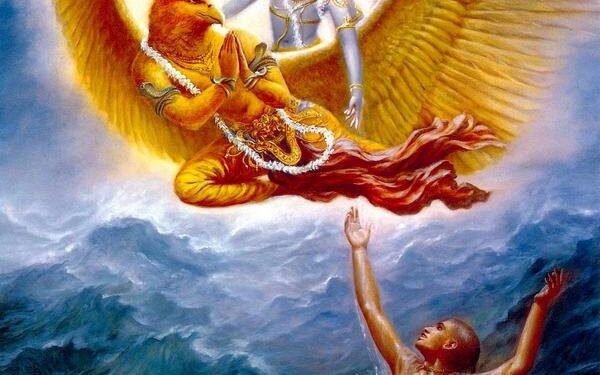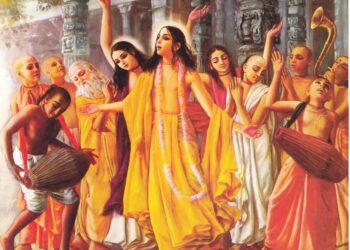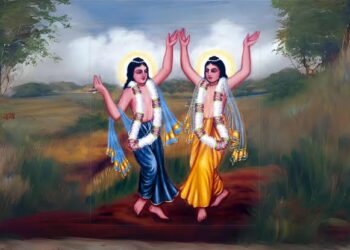1.111.25. Fie, fie upon men who yearn for the pleasures of body. Do not grieve over the thinness of body or loss of wealth. It is well known that the sons of Pandu and their wife suffered poverty for some time but came unscathed through it and were happy forever.
1.111.26. A king should maintain teams of courtesans and patronize their arts of music and dance. He should give sufficient protection to the science of archery and economics, too.
1.111.27. The king who becomes angry with his servants without sufficient cause actually takes in the poison vomited by a black serpent.
1.111.28. A king should avoid fickleness and false utterances towards all men, especially to Vedic scholars and his personal attendants.
1.111.29. Proud of his servants and kinsmen, if a king remains complacent and begins sports and dalliance he is sure to be outwitted by the enemy.
1.111.30. It is despicable on his part to fret and fume without faults in others. He who punishes servants unjustifiably becomes a victim of the enemie’s attack.
1.111.31. A king should abandon sensuous enjoyments and pleasures. Such people become easy targets of enemies who are always on the alert.
1.111.32. Enterprise, adventurousness, courage, intellect, prowess and valour – he who possesses these six is viewed with suspicious awe even by devas.
1.111.33. Where results are not remarkable even after energetic exertion it is due to an adverse fate. Still man should put up endeavour and take resort to fruitful activities.
Suta said:
1.112.1. Servants are of various types – the excellent, the middling and the base. They should be employed befittingly in the three types of jobs.
1.112.2. I shall narrate the mode of test for servants and the qualities necessary for different jobs as narrated by authorities on them.
1.112.3. Just as gold is tested in the four ways by rubbing on the touchstone, cutting, beating and melting, so also a servant is tested by his appearance, conduct, parentage and activities.
1.112.4. A man of noble family, endowed with good character and qualities, truthful and virtuous, handsome and pleasant-mannered should be appointed as the officer-in-charge of the treasury.
1.112.5. He who can appraise the value, shape and size (of gold, gems etc.), should be appointed as the chief jeweller. A man who can understand strength and weakness of the soldiers should be appointed as the commander-in-chief.
1.112.6. The chief of watch and ward should be a mind-reader who can understand each and every gesture, is strong, comely to look at, unerring and competent to strike a timely blow.
1.112.7. The chief secretary to the king should be intelligent, clever in conversation, shrewd, truthful in speech, with sense organs under his control, and acquainted with all sastras.
1.112.8. The chief ambassador should be intelligent, sensible, a reader of others’ minds, ruthless and blunt in speaking facts.
1.112.9. The officer-in-charge virtue should be well versed in smrti texts, a scholar of great erudition, with good control over his sense organs and equipped with the qualities of heroism, valour and other good qualities.
1.112.10. The head cook should be a man whose father and grandfather had served in a similar capacity. He should be skilful, truthful and acquainted with sastras. He should be clean in person and capable of hard work.
1.112.11. The royal physician shall be well-versed in Ayurveda with enough practical experience. He should have all the qualities of a decent man and look comely in appearance.
1.112.12. The royal priest should be a great scholar in Vedas and their ancillaries. He should be observing japas and homas. He should readily bless everyone.
1.112.13. Whether he is a writer, or a reciter, an accountant or a chief executive, if anyone is found to be lazy, he should at once be dismissed.
1.112.14. The mouths of a wicked man and a serpent are sources of distress – since they are double-tongued, causing pain, ruthless and terrific.
1.112.15. A wicked man should be avoided even if he happens to be a scholar. Is not a serpent terrific though its head is bedecked with a precious gem?
1.112.16. Who is not afraid of the wicked who is furious without provocation? It is the wicked from whose mouth the poison of a great serpent in the form of unbearable words flows out continuously.
1.112.17. If a salaried servant of the king becomes so rich as to vie with him, is of equal competency, knows his inner secrets and vulnerable points, is very industrious and puts up a claim to half of his kingdom there is no harm if the king puts him to death.
1.112.18. Those servants are not to be retained who were at first valorous, slow and gentle of speech, truthful and self-controlled but later on proved to be otherwise.
1.112.19. Servants of this type are very rare – servants who are not lazy, who are satisfied, who can be easily roused from sleep in emergency, who have the equanimity in happiness and sorrow and who are courageous.


















